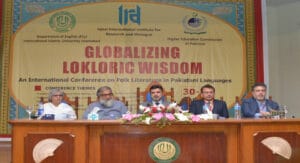 Rector International Islamic University Islamabad (IIUI) Prof. Dr. Masoom Yasinzai has said that if we present our folk literature and culture in the world using modern resources then we as a strong nation can be persuaded. He expressed these views while addressing the concluding session of a two-day International Conference on “Globalizing Lokloric Wisdom” on Folk Literature in Pakistani Languages.
Rector International Islamic University Islamabad (IIUI) Prof. Dr. Masoom Yasinzai has said that if we present our folk literature and culture in the world using modern resources then we as a strong nation can be persuaded. He expressed these views while addressing the concluding session of a two-day International Conference on “Globalizing Lokloric Wisdom” on Folk Literature in Pakistani Languages.
Dr. Masoom Yasinzai said that it is our good fortune that Pakistan has thousands of years of history, folk literature and culture in spite of its existence 75 years ago. Of course Pakistan was created in 1947 but the realm of civilization has diverse cultural roots. Dr. Yasinzai further said that the international media portrays Pakistan as a terrorist and unsecure country but the reality is quite the opposite. Our country is the custodian of peaceful traditions attached to its diverse culture. On the occasion, he expressed his determination that the Islamic University would continue to play its role in preserving and promoting the traditions of the region.
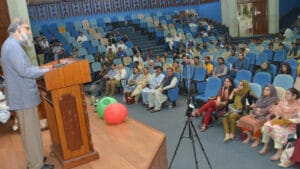
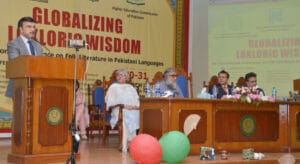 Dr. Yousuf Kushk, Chairman, Pakistan Academy of Letters said that we are proud of Pakistan’s cultural heritage and should remain so because we are not inferior in folk literature and culture. He told the conference participants that a National Museum of Pakistani Languages will be set up in Islamabad soon. Dr. Yusuf lauded the efforts of the International Islamic University Islamabad for the revival and promotion of folk literature and culture.
Dr. Yousuf Kushk, Chairman, Pakistan Academy of Letters said that we are proud of Pakistan’s cultural heritage and should remain so because we are not inferior in folk literature and culture. He told the conference participants that a National Museum of Pakistani Languages will be set up in Islamabad soon. Dr. Yusuf lauded the efforts of the International Islamic University Islamabad for the revival and promotion of folk literature and culture.
The two-day International Conference on “Globalizing Lokloric Wisdom” on folk literature in Pakistani Languages was jointly organized by Iqbal International Institute for Research & Dialogue, IRD, IIUI, Department of English Literature, Faculty of Languages and Literature, FLL of the University in collaboration with the Higher Education Commission, HEC, Islamabad at Quaid-E-Azam Auditorium, Faisal Masjid Campus, International Islamic University Islamabad.
 Vice
Vice President (Academics), Prof. Dr. Ayaz Afsar and Vice President (R&E), Prof. Dr. Ahmed Shuja Syed also attended the conference on the first day and shared their views about the theme of the conference. The conference focused on storytelling, folk poetry, Sufi poetry, religious harmony in Pakistani languages and the impact of folk literature and topics related to folk literature in Pakistani Languages in the perspective of Global Lokloric Wisdom in which as many as 80 research papers were presented.
President (Academics), Prof. Dr. Ayaz Afsar and Vice President (R&E), Prof. Dr. Ahmed Shuja Syed also attended the conference on the first day and shared their views about the theme of the conference. The conference focused on storytelling, folk poetry, Sufi poetry, religious harmony in Pakistani languages and the impact of folk literature and topics related to folk literature in Pakistani Languages in the perspective of Global Lokloric Wisdom in which as many as 80 research papers were presented.
Dr. Husnul Amin, Executive Director, Iqbal Institute for Research and Dialogue (IRD), IIUI, said that it is a highly recognized fact that nations which forget their folk literature and cultures, lose their geographical position. The International Islamic University has organized this International Conference in view of these facts. Dr. Husnul Amin congratulated the moderator of the conference Dr. Sheraz Dasti and the entire team for organizing the international conference successfully.
Dr. Najeeba Arif, Dean Faculty of Languages and Literature, FLL, IIUI during her speech elaborated folk lore in detail and said that folk lore is not only the history as it is in reality a geography. She added that the base of science is experience while folklore is the crux of human experience while folklore is composed of experiences of centuries. Dr. Najeeba explained to the conference participants how folklore is the collective wisdom connected to experiences of human’s lives through various interesting examples.
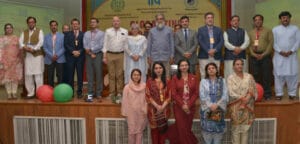 In various meetings, eminent scholars and literary and cultural experts spoke on various topics. During the two-day conference, Simon J. Bruner, a distinguished professor of social sciences at the American University of Wisconsin, spoke in detail about the dangers posed to folklore and culture in the digital age. He said in his online address that the cultural heritage of the world is facing the challenges of the digital age, in which only those folk literature and culture will be able to survive if they understand the requirements of the modern age. The posts will be vacant. He also appreciated the services of Dawood Khan Dawood for language and literature and termed his efforts as a source of pride. Various researchers have discussed the history of storytelling, its evolution, and its far-reaching effects.
In various meetings, eminent scholars and literary and cultural experts spoke on various topics. During the two-day conference, Simon J. Bruner, a distinguished professor of social sciences at the American University of Wisconsin, spoke in detail about the dangers posed to folklore and culture in the digital age. He said in his online address that the cultural heritage of the world is facing the challenges of the digital age, in which only those folk literature and culture will be able to survive if they understand the requirements of the modern age. The posts will be vacant. He also appreciated the services of Dawood Khan Dawood for language and literature and termed his efforts as a source of pride. Various researchers have discussed the history of storytelling, its evolution, and its far-reaching effects.
Guest speakers Garmeet Kaur and Warda Shahzadi from Canada also spoke in the conference. Several parallel meetings were also held on the second day, out of which Dr. Humaira Ashfaq, Head Department of Urdu, FLL, Female Campus, IUI presided over the meeting on “Folk Culture and Presentation”. In the meeting, experts discussed the history and tradition of theater in storytelling and Seraiki literature.
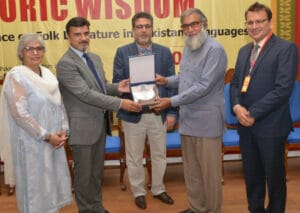
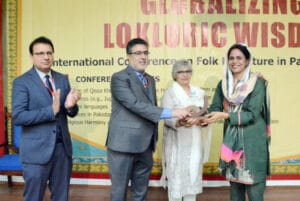 The researchers include Maria Kulsoom, Rabab Batool, Kanzi Iftikhar, Amna Meraj, Waqar Mustafa Sehra, Asif Mehsud Rana and Shumaila Taj. Dr. Aziz Ibn Al-Hassan presided over the meeting on “Sufism and Folk Literature”. In the meeting, Punjabi language Sufi stories, translations of poetry of Balha Shah and Madholal Hussain, romantic poetry of Khawaja Ghulam Farid in Sufism, revival of Sufism and folk literature tradition in the context of globalization, romance in poetry of Sachal Sarmast. Mohammad Saleh Habib and Fakhra Noorin spoke on the topics. In the meeting chaired by Dr. Arusa Kanwal, Shoaib Mansoor, Anam Rasheed, Fatima Syeda and Saud Hanif discussed fake stories in folk literature in Pakistan, elements of folk culture in Abid Hussain Abid’s poetry, resistance in gender poetry, Rajendra Singh Bedi. Shed light on Lodge Venti in detail. Haryanvi folk literature, the first theater drama song in the subcontinent, the ancient center of Sindhi folk literature, Gatha, presentation of space and housing in Pashto Charbita, connection and connection in fish and folk tales, unique genre and tradition of Pashto poetry The meeting was chaired by Dr. Manzoor Ali Vaithrio addressed the meeting. In the meeting chaired by Dr. Hafiz Abid Masood, “Tradition of Resistance in Folk Literature” was discussed. In this regard, Danish Ahmed, Rao Naeem Alam, Anam Feroze and Mohammad Naeem-ur-Rehman, Gulzar Jalal and Mohammad Bilal Sethi spoke on resistance in Pashto literature, Punjabi, condemnation of foreign invaders in folk literature and other topics. Prof. Dr. Naseeb A Simab discussed the issues of personality reflection in Pashto proverbs, reflection of Pakhtun women’s emotions, change of seasons in local languages, importance of Shajra Sharifa in Naqshbandi series and proverbs used on Punjabi women. Among the speakers were Syed Abdul Basit, Tauqeer Hussain Shah, Huma Butt, Mujeeb Ahmed, Muhammad Ilyas Bhatti and Azhar Khan.
The researchers include Maria Kulsoom, Rabab Batool, Kanzi Iftikhar, Amna Meraj, Waqar Mustafa Sehra, Asif Mehsud Rana and Shumaila Taj. Dr. Aziz Ibn Al-Hassan presided over the meeting on “Sufism and Folk Literature”. In the meeting, Punjabi language Sufi stories, translations of poetry of Balha Shah and Madholal Hussain, romantic poetry of Khawaja Ghulam Farid in Sufism, revival of Sufism and folk literature tradition in the context of globalization, romance in poetry of Sachal Sarmast. Mohammad Saleh Habib and Fakhra Noorin spoke on the topics. In the meeting chaired by Dr. Arusa Kanwal, Shoaib Mansoor, Anam Rasheed, Fatima Syeda and Saud Hanif discussed fake stories in folk literature in Pakistan, elements of folk culture in Abid Hussain Abid’s poetry, resistance in gender poetry, Rajendra Singh Bedi. Shed light on Lodge Venti in detail. Haryanvi folk literature, the first theater drama song in the subcontinent, the ancient center of Sindhi folk literature, Gatha, presentation of space and housing in Pashto Charbita, connection and connection in fish and folk tales, unique genre and tradition of Pashto poetry The meeting was chaired by Dr. Manzoor Ali Vaithrio addressed the meeting. In the meeting chaired by Dr. Hafiz Abid Masood, “Tradition of Resistance in Folk Literature” was discussed. In this regard, Danish Ahmed, Rao Naeem Alam, Anam Feroze and Mohammad Naeem-ur-Rehman, Gulzar Jalal and Mohammad Bilal Sethi spoke on resistance in Pashto literature, Punjabi, condemnation of foreign invaders in folk literature and other topics. Prof. Dr. Naseeb A Simab discussed the issues of personality reflection in Pashto proverbs, reflection of Pakhtun women’s emotions, change of seasons in local languages, importance of Shajra Sharifa in Naqshbandi series and proverbs used on Punjabi women. Among the speakers were Syed Abdul Basit, Tauqeer Hussain Shah, Huma Butt, Mujeeb Ahmed, Muhammad Ilyas Bhatti and Azhar Khan.
At the end of the conference commemorative shields were distributed among emerging researchers, intellectuals and the organizing team of the conference.

